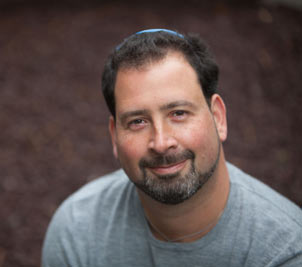About Rabbi Spike
Rabbi Spike Anderson was born and raised in Boston, MA. and was ordained at Hebrew Union College-Jewish Institute of Religion (HUC-JIR) in New York City. Before his decision to enter the rabbinate, Rabbi Anderson worked as an Executive Recruiter in New York and San Francisco. While at Seminary, Rabbi Anderson augmented his studies by serving two summers as an interfaith Chaplain at Dartmouth-Hitchcock Medical Center.
In addition to his rabbinic and pulpit responsibilities, Rabbi Anderson is dedicated to the Israel & Peoplehood pillar of Stephen S. Wise Temple. He works tirelessly to connect congregants with Israel through political action, social action, personal connection, cultural exchange, and study.
As the Rabbi for the Early Childhood Center (ECC) as well as the Kindergarten and Grade 1 students of the Elementary School, Rabbi Anderson has the pleasure of conducting weekly Shabbat services for our youngest members, as well as lively ‘Tot’ and ‘Family’ Shabbats throughout the year. Through song, movement, talking puppet shows and ridiculous costumes, he strives to create a dynamic yet comfortable environment for the children to learn and love their Judaism. With his open door policy and passion for pastoral care, he is honored to provide spiritual guidance to the children as well as their families.
Rabbi Anderson also has taken a leadership role in creating and implementing the ‘Kehillat Wise’ program within our congregational community. Launched in response to the economy crisis, the program is designed to empower congregants to help other congregants; and it has earned nation-wide recognition due to the invaluable variety of resources, programs, and one-on-one guidance.
Wise Hearts is a program that Rabbi Anderson is in the process of revitalizing and taking to the next level. Working with a dedicated committee, Rabbi Anderson oversees as temple members reach out to other temple members in times of joy and sadness, offering gifts, comfort, even help with carpool.
Rabbi Anderson takes the most joy out of being a teacher, and is proud to have students ranging from age 1 to 101 years old. His classroom ranges from congregant’s living rooms to his office at the Temple. This year, Rabbi Anderson will offer such classes as: “Your Personal Theology and Spiritual Journey”, “Finding God”, “Introduction to Judaism”, and “The Hunger Games: what Judaism might have to say about it”.
Ronen Levy Events
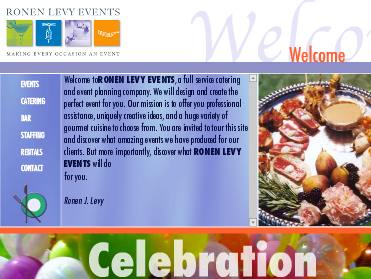 RONEN LEVY Productions is premier event planning, production, venues, catering and bar services for corporate or private events throughout Los Angeles and Southern California. The company will design and create the perfect event for you, including the wedding.
RONEN LEVY Productions is premier event planning, production, venues, catering and bar services for corporate or private events throughout Los Angeles and Southern California. The company will design and create the perfect event for you, including the wedding.
Contact Ronen: ronen@ronenlevy.com
Filed in: Vendors
Happy Chuppah Company
“Happy Chuppah of Orange County uses creativity and innovation to build beautiful Chuppah’s. We strive to bring you great customer service with the finest attention to detail from the largest event and to the most intimate gatherings of friends and family. Our talent ensures that your dreams and vision of our clients comes to life.
We offer a variety of Chuppah’s, Canopies, Mandap and 2 posted Arch. Among these, we offer flowers, Day of Coordination, Photo Booth rental and Candy Buffet.”
Filed in: Vendors
It is Real… It’s Israel
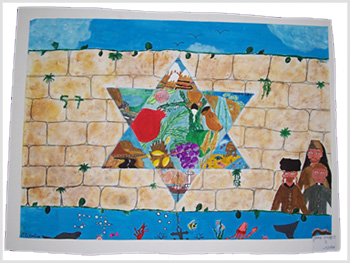
Israel Independence Day – Yom Haatzmaut
Each year on the Shabbat before Yom Ha’atzma-ut (Israel’s Independence Day), I traditionally tell our young children a puppet story about how Sha’arei the Eagle, and his best friend, Jacob the Mouse, saved all the animals and brought them to an amazing land. You see, this is a true story, even if it never happened. Once upon a time, all the animals were living in a land all together, when all of a sudden a giant storm came and blew the animals to the four corners of the earth – North, South, East, and West. And so, each settled where the winds took them, but they were very unhappy. The polar bear in the South was too hot; and the camel in the North was too cold; for the beaver in the East it was too loud; and for the owl in the West it was too quiet. The animals grew more and more unhappy until they finally called out to Sha’arei, the king of the Eagles, “Sha’arei, Sha’arei, come help us!” Sha’arei heard their cry, and came to their rescue, picking up each animal and bringing them back to their land. “This place is perfect, but is it real?” each animal asked in amazement. And to each, Sha’arei replied: “Yes, it is real. It is real. It’s … Israel.”
Now, for the kids, this story is entertaining and it begins to teach them some of our very real history. We Jews were blown by the storms of war and time to the four corners of the earth, and in each land, we were (most of the time) barely tolerated minorities susceptible to the whims of gentile rulers. But with the aliyot movements which culminated in the re-creation of the State of Israel in 1948, Jews from all over the world, once again, gathered together in one place to pursue our potential as a people … and our destiny. Today, Israel is not just a haven for Jews, but it is a spiritual and cultural homeland that empowers us to flourish like never before in the arts and sciences, spiritually and physically, as a living, dynamic culture that beams like a lantern for the whole world to see.
We know that Israel’s existence and continuous achievements are something to be celebrated in the truest sense of the word.
And so, we invite you to clear your calendar on April 14, and spend that entire Sunday with us here on the Wise campus for our 2nd annual Yom Ha’atzma-ut Festival. As you turn up our driveway, you will see blue and white flags shimmering in the breeze as far as the eye can see. The sounds of Israeli hip-hop will sizzle in the air from our DJ, even as the scent of Israeli cuisine turning on the spit makes your mouth water. On the basketball courts, our 3-on-3 basketball tournament players will be zipping and shooting, each playing for an Israeli charity of their choice.
Meanwhile, our youngest children will be interactively engaging in our kibbutz on the N2 yard, having their faces painted, or petting the friendly camel.
Everywhere you turn will be a festivity beckoning you to join in. What will you do first? Drink mint tea over backgammon from the shade of the flamboyant Moroccan Tent? Compete in our Israel Scavenger Hunt using your smart phone? Learn Hebrew through Krav Maga (Israeli martial arts) with our very own Meny Atias? Play Gaga with new friends? Join hands for Israeli dancing? Take a cardio class through Pulse Fitness? Please don’t rush, take your time, you can do it all.
At some point in the day, maybe after the Family Art Project or watching the 4th graders present a portion of their Yom Ha’atzma-ut performance, you will likely want to pay a visit to Hershenson Hall, where we are hosting an amazing art show with Michael Hittleman Gallery showing original works by some of the best Israeli artists ever to have lived – from the early pioneers to the leading avante garde creatives.
Aside from getting the entire congregational community on an airplane to Tel Aviv (let’s try that next!), this is the best way for us to celebrate Israel, and our love for her. And on April 14, with all of your senses engaged – your full body, mind, and spirit – you may catch the eye of a friend and say to her, “this is amazing … but is it real?” “Yes,” she will smile back at you, “it is real … it’s Israel.”
Bring everyone you know.
We will see you here.
Filed in: Articles
Signing of the Ketubah
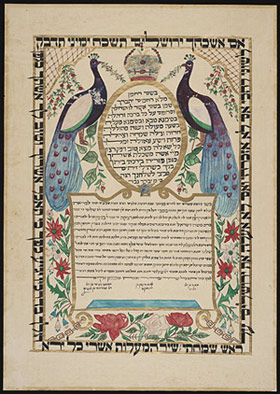
In Orthodox communities, after the tish the ketubah (Jewish marriage contract) is signed by the groom, the rabbi, and two male witnesses. In Reform and Conservative congregations, the bride may also sign the Ketubah, and additional lines can be added for female witnesses, too. – via TheKnot
The Ketubah, or marriage contract, is one of the oldest Jewish wedding traditions, dating back two thousand years. Traditionally, the Ketubah is a legal document protecting the bride’s rights, and thus is the possession of the bride. In the progressive spirit, many couples today choose to have a Ketubah that is egalitarian and contemporary, expressing the bride and groom’s commitment to care for one another and to create a Jewish home together. Typically, it is read and signed by witnesses, the rabbi, and the bride and groom in front of close family and friends immediately preceding the wedding ceremony.
Filed in: Ceremony
Chuppah
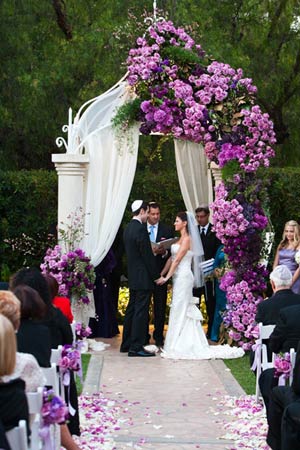
Jewish Wedding: Chuppah
The ceremony takes place under a Chuppah, or wedding canopy. It represents God’s sheltering presence in the lives of the bride and groom, as well as the new home that they will build together. The presence of family under the Chuppah, as well as its lack of walls, signify that their home will always be open to family and friends.
Filed in: Ceremony




